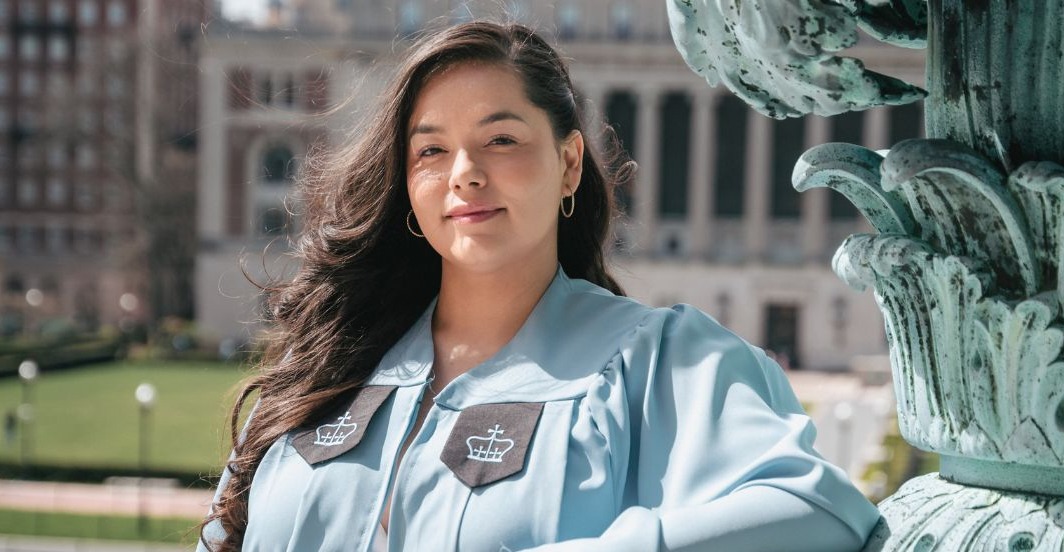Saira Ramirez Mingueta has vivid memories of visiting her grandparent’s home in Jalisco, Mexico, where she was born. “I was surrounded by plants, animals and chirping birds—it was magical. I felt at ease, loved and safe in nature.” Ramirez Mingueta, the second eldest of six children, was a baby when her family immigrated to the U.S. and settled in Los Angeles, but that early, deep connection to nature, family and community has informed her current climate policy path.
Ramirez Mingueta is a current MA candidate and David C. Lizarraga Fellow at the Columbia Climate School. We spoke with her about what led her to New York City and where she’ll go next.
What sparked your interest in advocating for your community and the environment?
I come from a Mexican immigrant family, and I was young when I took on the role of leader and translator to help my family navigate multiple complex systems—education, public transportation, healthcare—in this country. I grew up in East Los Angeles, and communities there are low income, lack green spaces, are surrounded by food deserts, and pollution is through the roof. They’re highly impacted by several climate hazards, and that fact made me angry and frustrated.
Attending college was a goal—how did you achieve that?
My journey is a non-traditional one, shaped by ambition, necessity, responsibility and loss. I began at Mt. San Antonio College, a community college, and got my associates degrees in English in 2019 while navigating a full-time job. I then transferred to Chapman University and earned a Bachelor of Fine Arts in Creative Writing in 2021.
After graduating, I landed a tech job in sales and was able to get my own place, help my family and build some financial freedom. However, I was missing community, and so I applied with the California Hispanic Chamber of Commerce (CHCC) for the Creating a Path to Success (CAPS) program. That program connected me with other young Latinx and provided me with professional development to start my own digital strategy and media business.
My work with the CHCC connected me with the California Climate Action Corps (CCAC) where I was partnered with the office of sustainability at the University of California, Riverside, on a project to build their zero-waste program on campus.
But what really moved me was hearing older, non-English-speaking immigrants share stories of children born with asthma or developing lung cancer, and saying how difficult it was to get medical attention in low income and immigrant communities. It was a full circle moment because, at that time, my mom was recovering from breast cancer. I was like, wow, this is what our community is up against—they are literally being poisoned.
I wanted to continue learning about the systems at play so that I could create change. I applied for a team leader position with CCAC and to the Columbia Climate School program.
How has your experience been at Columbia?
It took me a bit to adjust to a new city, but I eventually found my path and a group of strong women in my cohort. In class, climate hazards were talked about in a very theoretical way and it was hard for me to not have flashbacks, or feel the emotional weight that comes with being in this space when we’re talking about people dying because of the environment. I reached out for support and connected with Natalie A.Unwin-Kuruneri, assistant dean of Academic Affairs, for resources on campus, and Sarah Newman, founder and executive director of the Climate Mental Health Network. As a result, I worked with friends to initiate a student-led support group around mental health and climate work. We’ve had two events and created space for students to come, make art, talk about our experiences and build community.
You’ve made great connections with colleagues. How about professors?
Javier Lopez, Kristina Douglass, Thomas Chandler and Joshua L. DeVincenzo have all been incredible mentors and friends. Professor Douglass teaches integrative and justice-centered research in environment and climate. That should be a core class. It’s so validating to see another woman of color doing the work in this space. Talking with Professor Douglass has helped me understand that my mom’s cancer and the barriers that I faced are not just one person’s experience—this is happening at a national and a global level.
You will complete your degree in September. What’s next for you?
Although there were several exciting capstone project options, I ultimately decided to focus on the opportunity with the NYC Health Department, where I’ll work at the intersection of climate justice, public health and policy. I hope to build on this experience and eventually return to California and work with local and state-level agencies to advance climate justice initiatives.
This was a bittersweet year for you. In the midst of all your success, your mother passed away. What of her legacy do you carry with you?
My mom wanted me to make my dreams come true, and she sacrificed her life to create a better future for me. I carry her legacy with me and I want to make my mom proud. Being first generation means I have to make the path as I walk it, and I want to make a path not just for myself but also for my community and future generations.
Source link
Guest news.climate.columbia.edu

